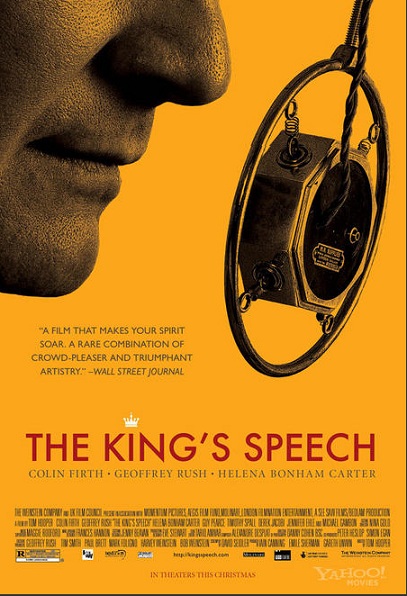
Unfairly, walking in to Tom Hopperís The Kingís Speech, I expected to hate it. Immensely. In my mind, it seems just the sort of Hollywood (British or not) fare that gains traction post-festival season, and is ballooned to the top by a charmingly silly, yet bottom-line serious, take on a historical event or an historical figure. In the case of The Kingís Speech King George VIís (Colin Firth) vehement stutter and the relationship it helped to foster between Bertie (King Georgeís childhood nickname) and Lionel Logue (Geoffrey Rush), a talented though unorthodox speech therapist. Sounds like a quirky set-up with a great cast but in the end, it just sounds like Oscar bait hub-bub. The kind of dime-a-dozen period pieces that always clog the projectors this time of the year, the same kind that I go out of my way to avoid. Yet, because of its talented cast and burgeoning directorial talent in Tom Hopper, The Kingís Speech rises above the usual Christmas-time dreck.
Iíll say this
quite frankly, The Kingís Speech is exactly the film
the trailers make it out to be. Itís a film about an
unexpected relationship and the way it deeply affects both
the life and rule of a man who never wanted to be king. King
George VI has a bad stutter and it makes him seem less
dependable as a ruling figure. When his father dies (Michael
Gambon, shortly but impressively) and his daft,
American-loving brother (Guy Pierce) attempts to marry a
divorced woman, the potential for kingship becomes
inevitable, and Georgie must deal come to terms with his
debilitating stutter. It could be a childrenís book, a
simple parable about differences and how we address them,
but instead because of a finely written script and two
outstanding performances by Firth and Rush, it becomes a
keen character study. Firth plays Bertie as a child who was
never given the chance to grow up. A man trapped within the
stuffy, tight parameters of a royalty, who has been
eviscerated by the daunting insecurities passed along to
him. In Rushís Lionel Logue he finds not only a man able to
stand up to the all-encompassing wall of royal pressure, but
someone who he feels comfortable with. A "friend" unlike any
he has ever had. And the film thrives when these two actors
are on screen together. The moments where Logue attempts to
break down Bertieís stutter are enjoyable in a silly way,
and beautifully (as the entire film is) portrayed by Hopper.
When the two men are separate, the filmís formulaic script
(we all know that Bertie becomes king and that his speech
turns out just fine) bubbles to the surface, and though itís
still enjoyable it doesnít have the sparkle the other scenes
downright gleam with.
|
